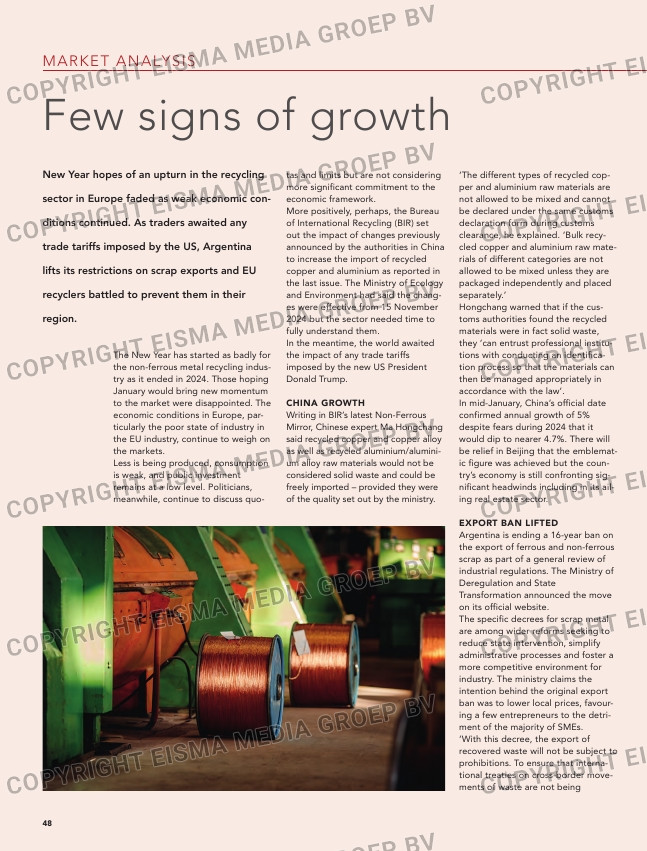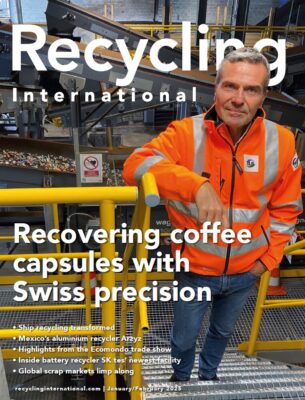Page 48 from: Recycling International Jan/Feb 2025

MARKET ANALYSIS
Few signs of growth
New Year hopes of an upturn in the recycling
sector in Europe faded as weak economic con-
ditions continued. As traders awaited any
trade tariffs imposed by the US, Argentina
lifts its restrictions on scrap exports and EU
recyclers battled to prevent them in their
region.
breached, the export is formalised by
means of a sworn declaration, with ex
post inspection by the
Undersecretariat of the Environment.
‘By aligning local prices with interna-
tional ones, the collection of such
waste is encouraged, not only will
exports increase but local prices will
also fall.’
EXPORT BAN FEAR
BIR added its voice to those con-
cerned at calls from primary alumini-
um and steel producers for restric-
tions on the export or recycled metals
from the European Union. BIR says
such scrap is a valuable resource in
global decarbonisation efforts and
export restrictions would ‘create an
unprecedented shock to the global
recycling industry’.
A strongly worded letter was sent in
mid-January to Ursula von der Leyen,
President of the European
Commission, and other senior officials
closely concerned the EU’s Green
Deal and the circular economy. It
came days after similar sentiments
from EuRIC, the umbrella organisa-
tion for recycling organisations.
‘Current calls for protectionism sug-
gest a fundamental unwillingness by
certain European companies to pay
fair market prices for recycled steel
and aluminium,’ BIR argues. ‘While
these materials are being purchased
abroad, this is not due to any short-
age, as European recyclers consis-
tently demonstrate their ability to
meet domestic demand.’
US ALUMINIUM
The Aluminum Association released
preliminary estimates showing
demand for the industry in North
America (US and Canada) increased
4.6% through the first three quarters
of 2024. ‘This continued demand
growth reflects the aluminium indus-
try’s strength and ability to compete in
a dynamic marketplace,’ said Charles
Johnson, president and ceo of the
Aluminum Association. ‘While there
may be some uncertainty ahead, alu-
minium will continue to be a critical
material used to build a stronger, more
sustainable America, and the industry
stands ready to deliver.’
48
tas and limits but are not considering
more significant commitment to the
economic framework.
More positively, perhaps, the Bureau
of International Recycling (BIR) set
out the impact of changes previously
announced by the authorities in China
to increase the import of recycled
copper and aluminium as reported in
the last issue. The Ministry of Ecology
and Environment had said the chang-
es were effective from 15 November
2024 but the sector needed time to
fully understand them.
In the meantime, the world awaited
the impact of any trade tariffs
imposed by the new US President
Donald Trump.
CHINA GROWTH
Writing in BIR’s latest Non-Ferrous
Mirror, Chinese expert Ma Hongchang
said recycled copper and copper alloy
as well as recycled aluminium/alumini-
um alloy raw materials would not be
considered solid waste and could be
freely imported – provided they were
of the quality set out by the ministry.
‘The different types of recycled cop-
per and aluminium raw materials are
not allowed to be mixed and cannot
be declared under the same customs
declaration form during customs
clearance, he explained. ‘Bulk recy-
cled copper and aluminium raw mate-
rials of different categories are not
allowed to be mixed unless they are
packaged independently and placed
separately.’
Hongchang warned that if the cus-
toms authorities found the recycled
materials were in fact solid waste,
they ‘can entrust professional institu-
tions with conducting an identifica-
tion process so that the materials can
then be managed appropriately in
accordance with the law’.
In mid-January, China’s official date
confirmed annual growth of 5%
despite fears during 2024 that it
would dip to nearer 4.7%. There will
be relief in Beijing that the emblemat-
ic figure was achieved but the coun-
try’s economy is still confronting sig-
nificant headwinds including in its ail-
ing real estate sector.
EXPORT BAN LIFTED
Argentina is ending a 16-year ban on
the export of ferrous and non-ferrous
scrap as part of a general review of
industrial regulations. The Ministry of
Deregulation and State
Transformation announced the move
on its official website.
The specific decrees for scrap metal
are among wider reforms seeking to
reduce state intervention, simplify
administrative processes and foster a
more competitive environment for
industry. The ministry claims the
intention behind the original export
ban was to lower local prices, favour-
ing a few entrepreneurs to the detri-
ment of the majority of SMEs.
‘With this decree, the export of
recovered waste will not be subject to
prohibitions. To ensure that interna-
tional treaties on cross-border move-
ments of waste are not being
The New Year has started as badly for
the non-ferrous metal recycling indus-
try as it ended in 2024. Those hoping
January would bring new momentum
to the market were disappointed. The
economic conditions in Europe, par-
ticularly the poor state of industry in
the EU industry, continue to weigh on
the markets.
Less is being produced, consumption
is weak, and public investment
remains at a low level. Politicians,
meanwhile, continue to discuss quo-
A U T H O R Robin Latchem P H O T O S Shutterstock
48-49-50_manon-ferrous.indd 48 29-01-2025 11:32



